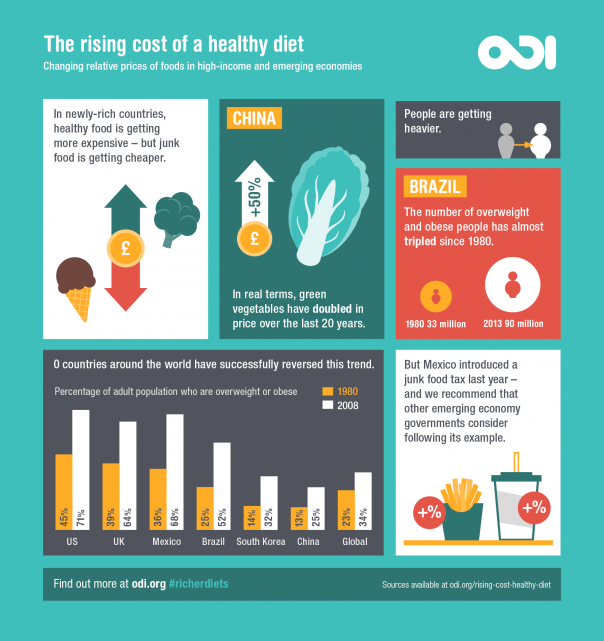
This effect has increased over the last 30–40 years, as energy-dense, processed foods have become cheaper relative to less energy-dense fruit and vegetables.
The report finds that prices of fruit and vegetables have risen substantially since 1990, mainly by between 2%–3% a year on average – or by 55–91% between 1990 and 2012.
It also finds that four of the six processed products for which estimates are significant show price falls since 1990. Most of the other foods have seen their prices rise by 1–2% a year, with the exception of the price falls for rice in Korea and chicken in Mexico. Ice cream and ready meals were among the foods that have dropped in price.
When Cost Sector Catering asked foodservice industry bodies for comment on the rise in cost of healthy produce, The University Caterers Organisation (TUCO) and the Hospital Caterers Association (HCA) noted that the measures they have in place help protect against the need to abandon fresh healthy options for the sake of cost.
Julie Barker, Chair of TUCO, said: “In the FE & HE sector we haven’t experienced any discernible increase in the price of fresh produce and put much of this down to a sustainable approach to buying.
“Within Brighton, and across all TUCO members, creating seasonal menus which reduces the reliance on foods from overseas is a key priority.
“This ultimately means that TUCO caterers can always opt for a regional supplier, which drives down the costs considerably as it can cut out of the middle man.
“We’re able to pass those savings on, ensuring our customers can afford to eat well when they wish.”
Philip Shelley, national chairman of the HCA, said: “Current buying methods within the Health Sector do vary, but my own experience within the NHS is that most prices are set for periods of time, which can often protect from sharp rises in short periods of time.
“However, fresh fruit and vegetables can be the one area that is guided by the market and the procurement of such items are often 'basket priced' to decide on the supplier for the week/month.
“Healthier options are often more expensive than other items and this has been a trend for some time. The Health Sector needs a stable market and if we are to promote the healthier choice then we need a fair price. The current financial pressures can dominate choices that we make.”
As a solution, the report suggests following Mexico’s example, where the government, since January 2014, has imposed a tax on junk food and sugar sweetened beverages.
Shelley said: “The tax on junk food in Mexico is a fascinating way to try and curb obesity, particularly when the UK demands choice and variety to allow people to make their own judgements.
“Have we reached a point when we need to make difficult decisions, taking choices away from people when there is an awareness that the choice is doing them harm?”
Today, it has been reported by The Independent that a tax on sugar could become a reality in the UK as Life Sciences Minister George Freeman, warned that food companies could be taxed if they continue to sell unhealthy food.
Speaking at the Hay Festival, Freeman said: “I think that where there is a commercial product which confers costs on all of us as a society, as in sugar, and where we can clearly show that the use of that leads to huge pressures on social costs, then we could be looking at recouping some of that through taxation.
“Companies should know that if you insist on selling those products, we will tax them.”
This comes on the same day that Tesco announces plans to reduce the sugar content of its soft drinks by five per cent every year.